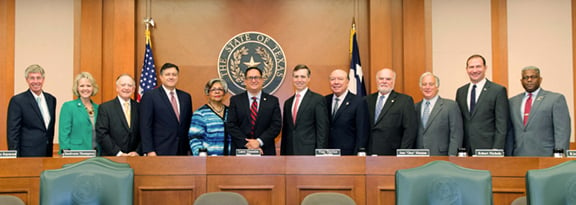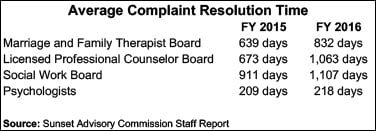Sunset Review rough for boards that license and regulate professionals who play key roles in child-custody cases

Part 6 in a Series
The Austin Bulldog’s investigation of problems in family law courts involving child-custody cases includes a review of complaints against some of the professionals appointed by courts to provide related services. Specific complaints will be detailed in later installments of this ongoing series. An overarching question is why does it take two or three years to resolve complaints against these practitioners? The answer was revealed in the biennial exercise known as Sunset in Texas, which is now underway.
Sunset in Texas is not the romantic experience the name might imply. It’s not a time for kicking back, sipping a beer, and watching the sun dip into the chilly waters of Lake Travis. Sunset in Texas is a time for a deep and probing examination of a good portion of the 130-odd Texas governmental agencies to learn how well they are performing. It’s a time for determining whether the sun should set on their work and deciding if these agencies should fade into history.
Although the Sunset process for the 2016-2017 cycle is scrutinizing 25 separate agencies, this story will focus solely on the four professions whose services are utilized to varying degrees in family law cases involving child custody: Professional Counselors, Psychologists, Social Workers, and Marriage and Family Therapists.
Practitioners in each of these professions are licensed and regulated by a separate Texas State Boards of Examiners. Each of these boards will be abolished unless lawmakers reauthorize them in the 85th Session of the Texas Legislature that convenes January 20.
As with all agencies now under review, if these four are reauthorized they could be radically reformed. They could also be moved under the umbrella of a different state agency.
Three of these Boards of Examiners—for Professional Counselors, Social Workers, and Marriage and Family Therapists, which collectively oversee some 50,000 licensees—currently receive administrative support from the Texas Department of State Health Services (DSHS).
It’s apparent these three boards will not be left to continue floundering as they have been, based on the scathing review of their performance aired during a December 8 hearing of the Sunset Advisory Commission. Under the current operating procedures and with insufficient staff support from DSHS, they have not kept up with the workload. The backlog of unresolved complaints against the professionals they regulate has grown exponentially in recent years.
 During Fiscal Years 2000 through 2006, the average length of time for these three boards to resolve complaints rarely exceeded 200 days. But since FY 2007 the length of time needed to resolve complaints has been rising steadily and now stands at 2.3 years for marriage and family therapists, 2.9 years for professional counselors, and 3 years for social workers.
During Fiscal Years 2000 through 2006, the average length of time for these three boards to resolve complaints rarely exceeded 200 days. But since FY 2007 the length of time needed to resolve complaints has been rising steadily and now stands at 2.3 years for marriage and family therapists, 2.9 years for professional counselors, and 3 years for social workers.
These delays fail to protect the health and safety of Texans—many of whom are struggling with litigation and mental stress. The delays also soil the reputation of practitioners who may have been wrongfully accused of misconduct and would like a timely opportunity to clear their names.
The Sunset Advisory Commission Staff Report recommended that the Board of Examiners of Professional Counselors, Social Workers, and Marriage and Family Therapists all be transferred to the Texas Department of Licensing and Regulation (TDLR) by August 31, 2018.
In addition the staff report recommended that the boards’ complaints and ethics committees be abolished, that board members not be involved in investigating complaints, and that TDLR develops a policy for prioritizing complaints and updates enforcement plans. In addition the report calls for throwing a wider net when checking the backgrounds for licensure applicants to include fingerprints and checks for disciplinary actions taken in other states.
Psychologist examiners board excels

In contrast to the other three boards that depend upon DSHS for support, the Board of Examiners of Psychologists is a standalone agency with its own staff. This agency has done a far better job of resolving complaints, taking on average 218 days to do so in FY 2016, Executive Director Darrel Spinks told The Austin Bulldog in an e-mail.
This board oversees 8,303 licensees who collectively account for 9,512 licenses, of which 1,209 are dual license holders.
The Sunset Advisory Commission’s Staff Report on the Board of Examiners of Psychologists did question the need for oral examinations as a prerequisite for licensure and requiring a year of post-doctoral supervision. These practices were defended in testimony given to the Commission.
The Sunset Advisory Commission’s Staff Report also recommended that the Board of Examiners of Psychologists be transferred to TDLR—but in a later phrase to be completed by August 31, 2020. By then the recommendations indicate that a total of nine agencies would be consolidated within TDLR’s Health Professions Division.
Board Member John Huffman of Southlake, an attorney, said that he was in favor of consolidation but he did not want the function moved into TDLR, given the current organization’s low staff turnover and high customer service ratings.
“We should not embrace remedies that put patients in danger,” Huffman said. “I urge a compromise to combine mental health and behavioral functions into one consolidated organization.”
Also opposing consolidation was Kenda Dalrymple, an attorney with Carls McDonald & Dalrymple LLP in Austin, who represents psychologists before the board. “It’s important for the board to understand the underlying nature of those who file complaints,” she said.
Commission digs into problems

Robert Romig, staff attorney and policy analyst for the Sunset Advisory Commission, briefed Commissioners on the combined findings of the reviews conducted for the Professional Counselors, Social Workers, and Marriage and Family Therapists.
“Texans are not protected from dangerous practitioners,” Romig warned. “Something must change, and change drastically.”

This trend toward increasingly large backlogs of unresolved complaints was evident even two years ago but, “We didn’t have as much information then,” said Sunset Staff Director Ken Levine. In response to comments by Commission members, Levine said that although the problem was partly due to these boards having to share DSHS resources, “It isn’t just the resources. These boards are not operating well.”
The board members expressed concerns about being transferred to TDLR and being reduced from fully autonomous boards to become advisory boards, but Levine said that agencies previously transferred to TDLR “can’t believe how much better services are.”
Romig said that the mounting backlog is made worse by the boards requiring that every complaint be investigated instead of allowing the boards’ executive directors to dismiss nonjurisdictional complaints. Complaints Committees hold hearings in which investigators read their reports, and the complainant and respondent testify, “Not because the Legislature told them to do this, but the way they decided to do it. The Boards said they didn’t know they could do things differently.”

Commissioner Richard Peña Raymond pointed out these boards collect far more in fees than the Legislature appropriates for their operations. Money charged for licensing fees should be used to set up these boards, operate a licensing process to ensure compliance, and adjudicate complaints in a timely manner—but the money was used for something else. “That’s why people are skeptical about government,” he said.
 Commissioner Juan “Chuy” Hinojosa said, “It doesn’t make any difference how much money you give them if the process is flawed.”
Commissioner Juan “Chuy” Hinojosa said, “It doesn’t make any difference how much money you give them if the process is flawed.”
Tim Speer, who supervises the Professional Licensing and Certification unit for DSHS, said that another reason for the growing backlog is that these boards usually meet only three or four times a year. He said a case cannot be fully resolved until a board makes a decision. If a case goes to a board and no decision is made, then it’s delayed until the next board meeting.
“My staff answers phone calls and processes applications,” Speer said. “We get around 6,000 calls a month and have five or six people to handle them.” TDLR has a better process, he said, with staff dedicated to handle applications and a separate staff dedicated to telephone support.
Marriage and family therapists board

Commission Vice Chair Van Taylor set the scene for board testimony by noting, “If you read the board members’ written responses you’ll see they are quite belligerent.”
Jennifer Smothermon of Abilene, chair of the Texas State Board of Examiners of Marriage and Family Therapists, was first to testify. In a segment that lasted nearly 90 minutes she proved to be as argumentative as Taylor had warned. Despite the tremendous backlog of unresolved complaints, she said that her board “serves as a national leader. Changing it to an advisory board (under TDLR) moves it from the front row to the back row nationally.”
In response to Taylor’s questions, Smothermon, who has been on this board since 2008 and was appointed chair in January 2016, said that she agreed the backlog was unacceptable, but added, “I was not aware that as chair I could change the process. … We have gone to staff and had conversations about the backlog but our board didn’t know we could completely overhaul the complaint process.”
She claimed that significant improvements were being made, despite the fact that the board has had four executive directors during her tenure. She pleaded to leave the board intact as an independent agency and not move it to TDLR.
Romig criticized the board’s process of holding public hearings in which the investigative results are aired, including details such as alleged improper sexual relationships with a client. “That very process is a breach of confidentiality,” he said.

Commission Chair Larry Gonzales said that other agencies used an informal process to settle complaints in a closed setting, but not this board. “We get to see what works well and what doesn’t work. We deal with a lot of agencies and we know what works,” he said.
Smothermon said if the board had the $1.6 million in funding from licensing fees that has not been appropriated for the board’s work it would improve customer service. Board member Rick Bruhn of Huntsville agreed, saying, “We strongly believe we have been underfunded.”
Gonzales read the backlog statistics aloud and said all three of these boards are now resolving fewer complaints than in years past and it is taking “six times as long. … This tells me it’s a systemic problem. … You can’t tell me this is a resources issue. It’s a process issue. Something is wrong with the way you do business. You don’t throw money at this to fix it. Something else is needed.”
“Sunset staff said that given these problems, something’s got to change. We will give you resources at TDLR,” Gonzales said. “I get it that you don’t want to go. … Everyone’s going to say, ‘Don’t move us.’ Everyone will say, ‘We’re different.’”
Smothermon replied, “You can move us, but please don’t take away our independent board structure, our rule making.”
Gonzales said, “I hear you but your board isn’t working well. You’re doing a terrible job. You had autonomy. You messed it up. If you still maintain your autonomy, what have I solved?”
In the continuing back and forth in which Smothermon pleaded for another chance to fix the problems, Gonzales replied, “This isn’t something unique to you. It’s fundamental about how this process works. That’s a huge policy shift. I’m not going to cherry-pick one or two and say, give them a chance.”
 Commissioner Dan Flynn added, “I’d rather see you have what you have, but you have to be responsive. You have a privilege—and when you don’t own up to the privilege we have to act.”
Commissioner Dan Flynn added, “I’d rather see you have what you have, but you have to be responsive. You have a privilege—and when you don’t own up to the privilege we have to act.”
 Commissioner Robert Nichols said he was concerned that a highly trained field of specialists that impacts lives might be negatively impacted if the board was put in an advisory role.
Commissioner Robert Nichols said he was concerned that a highly trained field of specialists that impacts lives might be negatively impacted if the board was put in an advisory role.
In response, TDLR Executive Director Brian Francis said he knows how important marriage counseling is and that reclassifying the board as advisors might seem to minimize its input. But he said the advisory board still would be “collaborating and guiding rule making” although final decisions would be made by the TDLR board.
 If these boards are transferred to TDLR, as recommended, their rules would be reworked and put in a standardized format for consistency among all the professions within the agency. Processes would be standardized. A disciplinary matrix would apply to all agency complaints. But it “gives comfort to know that experts on the advisory boards have control.”
If these boards are transferred to TDLR, as recommended, their rules would be reworked and put in a standardized format for consistency among all the professions within the agency. Processes would be standardized. A disciplinary matrix would apply to all agency complaints. But it “gives comfort to know that experts on the advisory boards have control.”
Drawing a rare spate of laughter in a meeting that stretched more than 10 hours without a break, Francis said, “We’re not trolling for more agencies. We not here to take your children. We’d be willing to work with any group.”
Social workers board
Timothy Martel Brown of Dallas, chair of the Board of Social Worker Examiners, didn’t even try to put up a fight. He saw the mounting backlog of complaints a year ago and looked to correct the situation, but, like Smothermon, he said, “I was not aware we had the opportunity to change the processes we inherited. I was told we do it this way to preserve the rights of the complainants and respondents.
“Now we are told we have the ability to change and we will meet to see what we need to do,” Brown said.
Professional counselors board
Glynda Corley of Round Rock, who chairs the Board of Examiners of Professional Counselors, said, “We get stacks of complaints” and board members are more embarrassed than anyone about the growing backlog. She said board members were never told they could resolve complaints through a more informal process.
“I feel kicked in the gut here. We work really hard, spend tons of time reading, then we’re getting questioned. If I sound tart, I mean to,” Corley said.
She said the board had enjoyed the services of the same executive director for 16 years and didn’t have this problem until people started leaving. “We saw the handwriting on the wall.”
Corley said she had cried out for help in resolving these problems, including meeting with the governor multiple times as well as a state senator, and she had sent letters.
Board Vice Chair Steven Christopherson of Pasadena said he had been on the board since 2009 and never missed a meeting. “The backlog is gut-wrenching to us. Three years is horrible.” It was only when a new attorney was assigned to the board that members learned how the Board of Examiners of Psychologists handled business and we saw a better way. “We’re going to get after that backlog,” he said.
Commission Vice Chair Taylor took Corley to task, saying of her written response to the sunset staff report, “This is an unusually flippant and unprofessional letter, taking a swing at DSHS and Sunset. You need to take responsibility.”
Corley said she did take responsibility but pointed out the board had been “begging and pleading,” saying, “We have a problem. Please pay attention to it.”
Commissioner Nichols said the Sunset process “is looking for efficiencies but to make sure that professionals set the rules and guidelines for the profession. I think we’re going to get that (at TDLR). We’re trying to get you to an efficient environment.”
Fates to be decided by Legislature
The Sunset Advisory Commission is tentatively scheduled to meet again January 11 to make decisions and approve whatever recommendations it will make to the Legislature for these four agencies. The date is subject to change, however, and no public comments will be taken at that meeting.
The process of reviewing the 130-odd state agencies in Texas had its genesis in 1977 when the Texas Legislature enacted the Texas Sunset Act. The basic premise puts a clock on each agency’s existence. In the year or so leading up to that date a staff conducts a review and publishes recommendations. Unless the Legislature passes a bill to continue an agency under review, it will go out of existence.
Links: The following links provide access to the self-evaluation reports filed by each board, the full staff reports, executive summaries of the full staff reports, and all public comments filed for the Sunset process. (Note that the full staff reports for the first three boards were combined into a single document, while the review for psychologists is in a separate report.)
Texas State Board of Examiners of Professional Counselors
Texas State Board of Examiners for Marriage and Family Therapists
Texas State Board of Social Worker Examiners
Texas State Board of Examiners of Psychologists
Related Bulldog coverage:
A Troubled Father’s Last Chance: A mother fears he has not kicked his addictions or changed his ways, October 26, 2016.
Custody Dispute Ends in Mistrial: Care of twin boys unchanged after week-long trial in Travis County case, May 24, 2016
Parents Demand Halt to Extortion: Texas Association for Children and Families and parents demand reforms under threat of lawsuit, April 18, 2016
A Tale of Two Counties: Child custody cases get help in Travis County but in Williamson and most other counties you’re on your own, March 15, 2016







